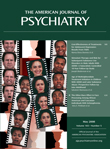Stimulant Therapy and Risk for Subsequent Substance Use Disorders in Male Adults With ADHD: A Naturalistic Controlled 10-Year Follow-Up Study
Abstract
Objective: The extant literature does not provide definite answers pertaining to whether stimulant treatment increases, decreases, or does not affect the risk for subsequent substance use disorders in youths with attention deficit hyperactivity disorder (ADHD). The authors examined the association between stimulant treatment in childhood and adolescence and subsequent substance use disorders (alcohol, drug, and nicotine) into the young adult years. Method: The authors conducted a 10-year prospective follow-up study. One hundred forty male Caucasian children with ADHD, ages 6 to 17, were examined at baseline. Of these, 112 (80%) were reassessed at the 10-year follow-up (mean age at follow-up=22 years). Assessments were made using Cox proportional hazards survival models. All models were adjusted for conduct disorder, since conduct disorder is a potent predictor of subsequent substance use disorders. Results: Of the 112 ADHD subjects who were reassessed at the 10-year follow-up, 82 (73%) had been treated previously with stimulants and 25 (22%) were undergoing stimulant treatment at the time of the follow-up assessment. There were no statistically significant associations between stimulant treatment and alcohol, drug, or nicotine use disorders. Conclusions: The findings revealed no evidence that stimulant treatment increases or decreases the risk for subsequent substance use disorders in children and adolescents with ADHD when they reach young adulthood.



